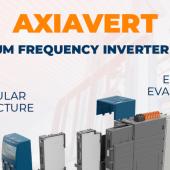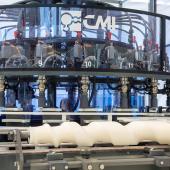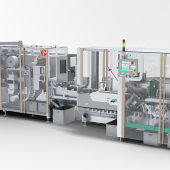Sustainable chemistry
BASF focuses on Ecovio®: a multi-use compostable polymer partially made from renewable raw materials.
Its outstanding barrier properties and versatility make it an ideal solution for the production of various materials, including packaging… and it’s food contact safe.
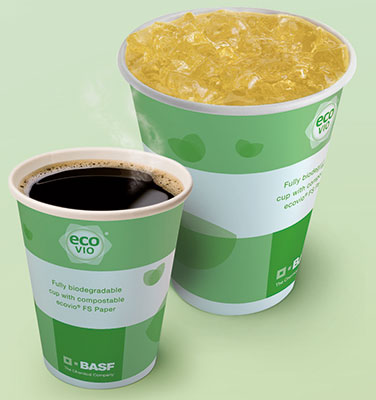 BASF - a global chemicals giant - didn’t miss the opportunity to appear at Ecomondo, the ideal venue to showcase its commitment to researching compostable polymers and sustainability.
BASF - a global chemicals giant - didn’t miss the opportunity to appear at Ecomondo, the ideal venue to showcase its commitment to researching compostable polymers and sustainability.
In particular, last October at the Rimini event, the company illustrated for sector operators the high performance and versatility of its compostable bioplastic ecovio® (see box).Below is reported the viewpoint of Water Savoia (packaging manager of BASF Italia), in an interview concerning the use and potential of this product in the field of food packaging, in particular as far as extrusion on paper and board is concerned, also in light of new legislation on the topic, both pending and beyond.
What are the commercial applications currently available on the market for this product, both water-based spray and extrusion coating?
The range of BASF products offering barrier solutions for paper and board includes Ultramid®, ecovio® and Epotal®. Before going into detail about ecovio®’s characteristics, one point should be made: high barrier polymer extrusion on paper and carton is now a well-established practice, although its use is limited to certain packaging sectors.
Thanks to BASF’s Ultramid®, polyamide coextrusion is a niche application, but one which enables achieving exceptional barrier characteristics against oils, water, steam, gases and mineral oil contaminants. In this case, the fields of application directly concern food packaging due to the product’s exceptional oxygen barrier.
Extrusion of the biopolymer ecovio®, on the other hand, represents a promising option not only in terms of the packaging’s end of life, thanks to our product’s complete compostability, but also thanks to its oil and water barrier properties, as well as its protection from contaminants to the food, inside and outside the packaging.
Its applications lie mainly in the sector of disposable articles for fast food and catering (plates, trays, cups, wrapping paper) and are also starting to take hold in the field of food packaging in response to developments in the regulations governing food safety and the use of recycled fibers.
BASF’s Epotal® sprays, on the other hand, are used in all paper and cardboard applications that do not require a high barrier but must in any case guarantee the recyclability of paper packaging, primarily disposable fast food articles (oil barrier), but also applications for “non-food” materials, such as detergents and powders, for which a water and humidity barrier is very important.Furthermore, there exists a barrier solution against mineral oils and contaminants, but with performance inferior to biopolymers and polyamide. Potential application developments for the sprays are promising: for the moment their use is limited to paper coating, but in future it may also be extended to packaging manufacturers through printing applications.
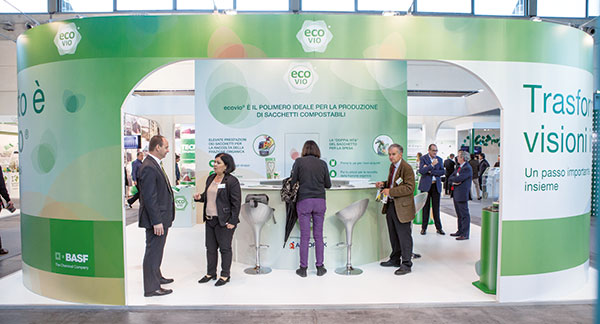
What are the obstacles to the spread of materials using the functional barrier offered by ecovio®?
Mainly the difference in cost compared to polyethylene, which, for many wide consumption goods such as paper cups, is still significant. Secondly, extrusion represents an additional step in the production process for creating the final product, entailing an increase in costs.
Thirdly, the absence of precise regulations governing the use of packaging made from recycled fibers, which would require an effective barrier function.
Speaking of functional barriers (particularly against mineral oils), what is the state of the art of Italian and European regulation, and what are the foreseeable developments in this arena?
In recent years, the leader has been Germany, which has developed a few directives that should go into effect as law in 2015.
Various paper packaging producers are testing the most advantageous solutions, especially for solutions that require recycled fibers. But neither can virgin fiber packaging be considered suitable as a barrier against mineral oil contaminants, since the danger of cross-contamination from corrugated cardboard secondary packaging has been proven.
It’s a certainty that, should the German regulation become law, the world of paper and cardboard packaging will undergo a revolution and will be subject to the pressure of end users (the major food industries and retail, first and foremost) on their suppliers of packaging products.
Already, albeit to a limited degree, we are beginning to receive requests for the use of functional barriers in paper packaging.
|
Getting to know Ecovio® A polymer that is robust, elastic and compostable, with excellent barrier performance against water, oils, aromas, contaminant migration and mineral oils from recycled materials. Ecovio®, developed by BASF, is already widely used in the production of bags for organic refuse management, including for “double life” use (first as a shopper for groceries, then for compost collection in the home). Developed in compliance with European standards for packaging and materials in contact with food products, ecovio® is used for coating disposable paper and carton articles (plates and cups) and thermoformed tubs for food packaging, as well as rigid plastic articles, such as, for example, coffee capsules (making them totally compostable along with food waste) or the shrink wrap films used for multi-packs for fish, meat or cheese. It should be kept in mind that, in addition to international standards for composting (including in the home), the product is certified as biodegradable in the soil, which is why it is used to make mulching films for farming and gardens. The various products made with ecovio®, once used, can be disposed of in an industrial composting facility. Microorganisms cause the material to biodegrade, transforming the product and its contents into compost in just weeks (the ecovio® bag biodegrades into water and CO2). Compost enhances the fertility of soils, enabling a reduction in the use of mineral fertilizers and, most importantly, reducing the quantity of organic waste otherwise destined for the landfill or incinerator.. Market notes. BASF has signed an agreement with Arcoplex Trading for the distribution of ecovio® line products for film extrusion in Italy. BASF, which will also maintain its direct channel, has chosen to collaborate with Arcoplex due to the latter’s firm knowledge of the market and efficient commercial network. |











